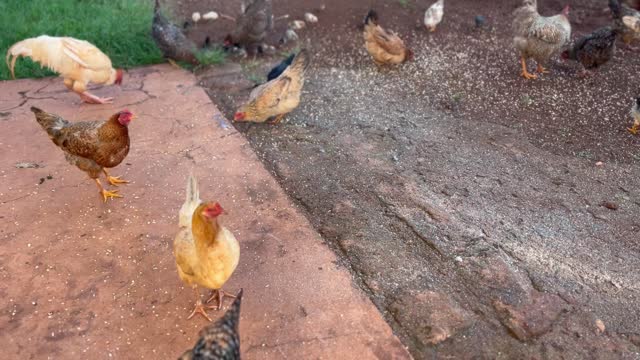Premium Only Content

I FEED MY CHICKS AND THEY LOVE ME
Build Your Own High Quality Egg Hatching Incubator On a Budget!
https://715cd2z5xm5x9lafv70wn4y16g.hop.clickbank.net
Are you looking for a way to bring your egg hatching projects to the next level? If so, then you are in the right place! Building your own egg incubator is not only a cost-effective way to get started, but it can also provide you with a high-quality hatching machine that will last for years to come. In this blog post, we’ll be discussing everything you need to know about egg incubators, the benefits of using a DIY egg incubator, the supplies you need to build one, a step-by-step guide to making your own, tips for successful egg incubation, best practices for egg incubation, common mistakes when building your own, and a troubleshooting guide for your egg incubator. Let’s get started!
Introduction to Egg Incubators
An egg incubator is a device that creates a controlled environment for eggs to hatch. They are used in poultry farming, scientific research, and by hobbyists for hatching eggs. The incubator keeps the temperature and humidity at the optimal levels for egg development and hatching. The incubator also provides the right amount of ventilation to the eggs and regulates the temperature and humidity levels throughout the incubation period.
The most basic egg incubators consist of a temperature controller, a heating element, an air pump, an egg turner, and a fan to regulate air circulation. More advanced models may also include a humidity control, a light source, and a water reservoir.
The temperature and humidity levels must be monitored carefully throughout the incubation period to ensure that the eggs are developing properly. If the conditions are not ideal, the eggs may not survive or may not hatch.
What to Look for in an Egg Incubator
When shopping for an egg incubator, there are several factors to consider. The first is the size of the incubator. How many eggs do you want to hatch at a time? Most egg incubators are designed to hold between 12-24 eggs, but there are larger models that can accommodate up to 100 eggs.
The next factor to consider is the temperature range. Most egg incubators are designed to maintain a temperature range of 99-103 degrees Fahrenheit. Make sure to check the temperature range of the model you are considering before making a purchase.
The humidity range is also important. Most egg incubators are designed to maintain a humidity range of 40-60%. If the humidity is too low, the eggs may dry out and not hatch. If the humidity is too high, the eggs may become waterlogged and not hatch.
Finally, you should consider the features of the incubator. Some models have built-in egg turners, water reservoirs, and temperature and humidity controls. Others may have a built-in fan for air circulation and a light source for the eggs.
Benefits of Using a DIY Egg Incubator
Building your own egg incubator can be a cost-effective and rewarding experience. Not only can you save money on the cost of an egg incubator, but you can also customize the incubator to fit your needs. For example, you can add additional features, such as a light source, to the incubator.
Building your own egg incubator also allows you to use higher quality materials than those found in pre-made incubators. This means that your incubator will be more durable and last longer.
Finally, building your own egg incubator is a great way to learn more about the process of hatching eggs. You will gain a better understanding of the incubation process, which will help you better care for your eggs.
Supplies Needed to Build an Egg Incubator
Building your own egg incubator is easier than you might think. All you need is a few basic supplies and a few hours of free time.
To get started, you will need:
A cardboard box or plastic container
A heat source, such as a light bulb or heating pad
An insulated material, such as Styrofoam or bubble wrap
An egg turner
A thermometer
A hygrometer
A fan
A water reservoir
An air pump
A light source (optional)
Step-by-Step Guide to Building an Egg Incubator
Start by finding a suitable cardboard box or plastic container. Make sure that the container is large enough to accommodate the number of eggs you plan to incubate.
Cut two pieces of Styrofoam or bubble wrap to fit the inside of the box. These pieces of insulation will help to keep the temperature and humidity levels stable.
Place the heat source in the box. This could be a light bulb, heating pad, or other type of heat source. Make sure that the heat source is securely attached to the box.
Attach the egg turner to the box. This device will rotate the eggs to ensure that they are evenly heated.
Place the thermometer and hygrometer in the box. These devices will help you monitor the temperature and humidity levels.
Attach the fan to the box. This will help to regulate air circulation.
Place the water reservoir in the box. This will help to maintain the proper humidity levels.
Attach the air pump to the box. This will help to circulate the air in the box.
If desired, you can attach a light source to the box. This will help to provide the eggs with the necessary light they need to develop properly.
Place the lid on the box and seal it shut.
And that’s it! You now have your own homemade egg incubator.
Tips for Successful Egg Incubation
Now that you have built your egg incubator, it’s time to start incubating eggs. Here are some tips for successful egg incubation:
Monitor the temperature and humidity levels throughout the incubation period.
Make sure that the eggs are rotated regularly.
Keep the incubator away from direct sunlight.
Add water to the reservoir as needed to maintain the proper humidity levels.
Make sure that the eggs are not exposed to extreme temperatures or sudden changes in temperature.
Make sure that the incubator is well ventilated.
Make sure that the incubator is kept clean and free of dust and debris.
Best Practices for Egg Incubation
Once you have built your incubator and started incubating eggs, it’s important to follow best practices for egg incubation. Here are some best practices to follow:
Make sure that the temperature and humidity levels are monitored and adjusted as needed.
Make sure that the eggs are turned regularly.
Make sure that the eggs are not exposed to direct sunlight.
Make sure that the incubator is clean and free of dust and debris.
Make sure that the incubator is well ventilated.
Make sure that the incubator is not exposed to extreme temperatures or sudden changes in temperature.
Make sure that the water reservoir is refilled as needed to maintain proper humidity levels.
Make sure that the eggs are not disturbed during the incubation period.
Common Mistakes When Building an Egg Incubator
Building your own egg incubator can be a rewarding experience, but there are a few common mistakes that people make when building their own. Here are some of the most common mistakes to avoid:
Not using an insulated material: Using an insulated material, such as Styrofoam or bubble wrap, will help to keep the temperature and humidity levels stable.
Not monitoring the temperature and humidity levels: It’s important to regularly monitor the temperature and humidity levels to make sure that the eggs are developing properly.
Not rotating the eggs regularly: It’s important to rotate the eggs regularly to ensure that they are evenly heated.
Not using a fan: A fan will help to regulate air circulation and provide the eggs with the oxygen they need to develop.
Not using a water reservoir: A water reservoir will help to maintain the proper humidity levels.
Not cleaning the incubator regularly: It’s important to keep the incubator clean and free of dust and debris.
Troubleshooting Guide for Egg Incubator
If you encounter any problems with your egg incubator, here are some troubleshooting tips:
If the temperature is too high or too low, make sure that the heat source is securely attached to the box and that the temperature is adjusted accordingly.
If the humidity is too high or too low, make sure that the water reservoir is refilled as needed to maintain the proper humidity levels.
If the eggs are not turning, make sure that the egg turner is securely attached to the box.
If the incubator is not well ventilated, make sure that the fan is securely attached to the box.
If the eggs are not developing properly, make sure that the incubator is not exposed to direct sunlight and that the temperature and humidity levels are being monitored and adjusted as needed.
Conclusion
Building your own egg incubator is a rewarding experience that can help you save money and have more control over your egg hatching projects. With the right supplies, a few hours of free time, and a little bit of patience, you can build your own high-quality egg incubator on a budget. Plus, you'll gain a better understanding of the incubation process and be able to better care for your eggs.
So, what are you waiting for? Get started on building your own egg incubator today! Click on the link below
https://715cd2z5xm5x9lafv70wn4y16g.hop.clickbank.net
-
 LIVE
LIVE
The Shannon Joy Show
3 hours ago🔥🔥Live EXCLUSIVE With Edward Dowd: Trump CANNOT Stop The Worldwide Economic Collapse🔥🔥
392 watching -
 1:03:32
1:03:32
The Dan Bongino Show
3 hours agoTrump Joins The Show To Drop Massive Truth Bombs (Ep. 2403) - 01/17/2025
205K682 -
 LIVE
LIVE
Right Side Broadcasting Network
3 days agoLIVE: RSBN Pre-Inauguration Coverage: Day Two Live from Washington D.C. - 1/17/25
2,952 watching -
 21:42
21:42
The Rubin Report
1 hour ago‘Piers Morgan’ Panelists' Jaws Drop as Liberal’s Entire Narrative Obliterated w/ One Question
13.3K20 -
 1:37:57
1:37:57
Steven Crowder
3 hours agoMAGA: T-Minus Three Days | Everything We Want President Trump to do on Day One
153K69 -
 1:14:04
1:14:04
Dave Portnoy
19 hours agoThe Unnamed Show With Dave Portnoy, Kirk Minihane, Ryan Whitney - Episode 42
35K5 -
 LIVE
LIVE
LFA TV
16 hours agoREBUILD PEDOWOOD! | LIVE FROM AMERICA 1.17.25 11am
5,098 watching -
 LIVE
LIVE
Caleb Hammer
18 hours agoI've Never Hated A More Vile Piece of Trash | Financial Audit
272 watching -
 LIVE
LIVE
Benny Johnson
4 hours ago🚨 Trump Shuts DOWN The Border LIVE Right Now | Kristi Noem Confirmation Hearing For DHS, Deport!
14,238 watching -
 3:06:00
3:06:00
Barry Cunningham
4 hours agoWATCH LIVE: Kristi Noem Secretary of Homeland Security Confirmation Hearing
39.1K14